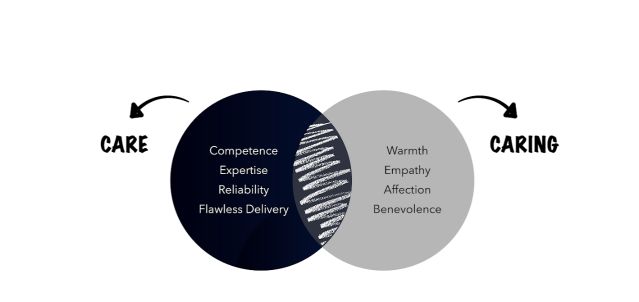Health
Patient Trust Is Not Just About Care—It’s Also About Caring
Building patient trust depends not just on competence, but also on benevolence.
Updated June 10, 2024 Reviewed by Lybi Ma
Key points
- Competence (care) and benevolence (caring) are foundational elements of trustworthiness.
- Focusing only on delivering proficient and reliable clinical care risks a myopic approach to trust-building.
- Imbuing patient care processes with benevolence and caring can help improve longer-term care trajectories.
Not long ago, during a meeting with a senior clinical pharmacist, the topic of my recently discovered hypertension came up. I had started taking prescription medications some time ago but had seen my blood pressure spike regularly. We checked my readings a few times during the day, and my numbers were out of range—the diastolic reading remained stubbornly high, and that was a particular concern. Over the months leading up to that moment, I had been inconsistently compliant with a commonly prescribed medication regimen of two medications to be taken in tandem.
What ensued was a discussion of the frightening, but realistic events that could occur—including atherosclerosis or a stroke—if my numbers were to remain where they were, let alone continue to rise, and the impact these events could have on my family. Despite my background as a pharmacist, it took this discussion to jolt me out of complacency and into steady compliance with my meds. My daily readings are close to normal on most days, and I am back to engaging in my lifelong passion, tennis, and committed to a regular exercise program, with the hope of warding off an escalation of therapy.
The pharmacist who inspired the positive change is a close friend with whom I go back more than forty years. We were in the same graduating class in pharmacy school, have been family friends since then, and more recently, have been working together. In essence, my much-needed shift did not result from just the care provided by a competent clinician — it was also spurred by the concern and benevolence of a caring friend.

Our research in the Journal of Marketing, and a recent meta-analysis of 50 years of trust research in the Journal of Consumer Research, have shown that competence (care), and benevolence (caring), are both foundational aspects by which the trustworthiness of a person or entity is judged.
Care
Delivery of high-quality health care relies on the professional competence, expertise, and reliability of the provider. It is the basis on which patient trust is built, and it is the foundation on which successful patient outcomes, both physical and psychological, are likely to be delivered. Modern healthcare systems including the training of professionals, formalization of procedures, and routinization of processes, are all built to enable the delivery of competent and reliable care. Recent advances, such as Atul Gawande’s checklist method (now used across hospitals in the United States) continue to help reduce avoidable errors in hospital care processes and thereby ensure reliability. Increasingly, AI-driven interventions also have the potential to help improve diagnostic accuracy, help mitigate patient harm by reducing errors, and continue to improve the reliability of patient care processes.
Caring
Caring, on the other hand, circumscribes aspects such as a caregiver’s empathy, warmth, and benevolence toward the patient. Caring is more likely to drive a patient’s personal connection with the provider, generating positive affective reactions and creating bonds that transcend professional arrangements. The establishment of a personal bond, approximating a familial relationship, could play a vital role in driving patient behaviors. Even when specific recommendations, such as sticking with a challenging exercise regimen or taking prescribed medication may be seen as personally disagreeable, the personal bond with the clinician can significantly influence the patient's willingness to comply.

Configurations for Delivering Care and Caring
a) In the most common case, a long-term relationship with a clinician and members of their extended clinical practice, can result in the development of trusted patient-provider bonds. Instances of the clinician going over and beyond normal expectations by, for example, calling a patient over a weekend to check on them, or providing their mobile phone number in the event of any immediate needs drive perceptions of provider benevolence and empathy. Over time, as in my case with my pharmacist friend, the professional clinician could end up informally playing the role of a caring caregiver.
b) Increasingly, family members including spouses, siblings, and children of patients have taken on, either voluntarily or out of necessity, the role of extended clinical caregivers for patients. Family members help patients manage symptoms, deal with medication side effects, coordinate care with medical practices, and so on. In these cases, caring family members end up in the role of the de facto (health) caregiver. Recent initiatives to help train, and even compensate family caregivers, would help equip them to deliver much-needed care.
c) For large populations of older patients, with their own families out of close proximity, dedicated services that essentially add the caring, familial, component to the mix are another way to complement care. Research has shown that for patients dealing with chronic diseases or acute conditions, depression can set in as a comorbidity, and loneliness can accelerate this process. As a result, in recent times, companies such as Papa have been spawned with the specific purpose of providing an alternative to familial relationships for elders who may need them. These companies add the warmth and companionship that can complement formal healthcare for older patients. Ratan Tata, the noted businessperson and philanthropist, has helped found Goodfellows, a companionship startup for senior citizens in India, a market with an estimated fifteen million elderly individuals living alone.
Regardless of the specific mechanism of delivery, complementing reliable and competent care with caring and empathy will serve patients well and contribute to improving their longer-term care trajectories.
References
Deepak Sirdeshmukh, Jagdip Singh, and Barry Sabol (2002), “Consumer Trust, Value and Loyalty in Relational Exchanges,” Journal of Marketing (66), January, 15-37.
Mansur Khamitov, Koushyar Rajavi, Der-Wei Huang, Yuly Hong (2024), "Consumer Trust: Meta-Analysis of 50 Years of Empirical Research." Journal of Consumer Research, 51 (1), 7–18.


